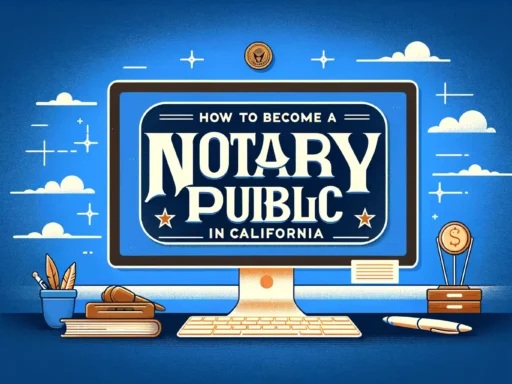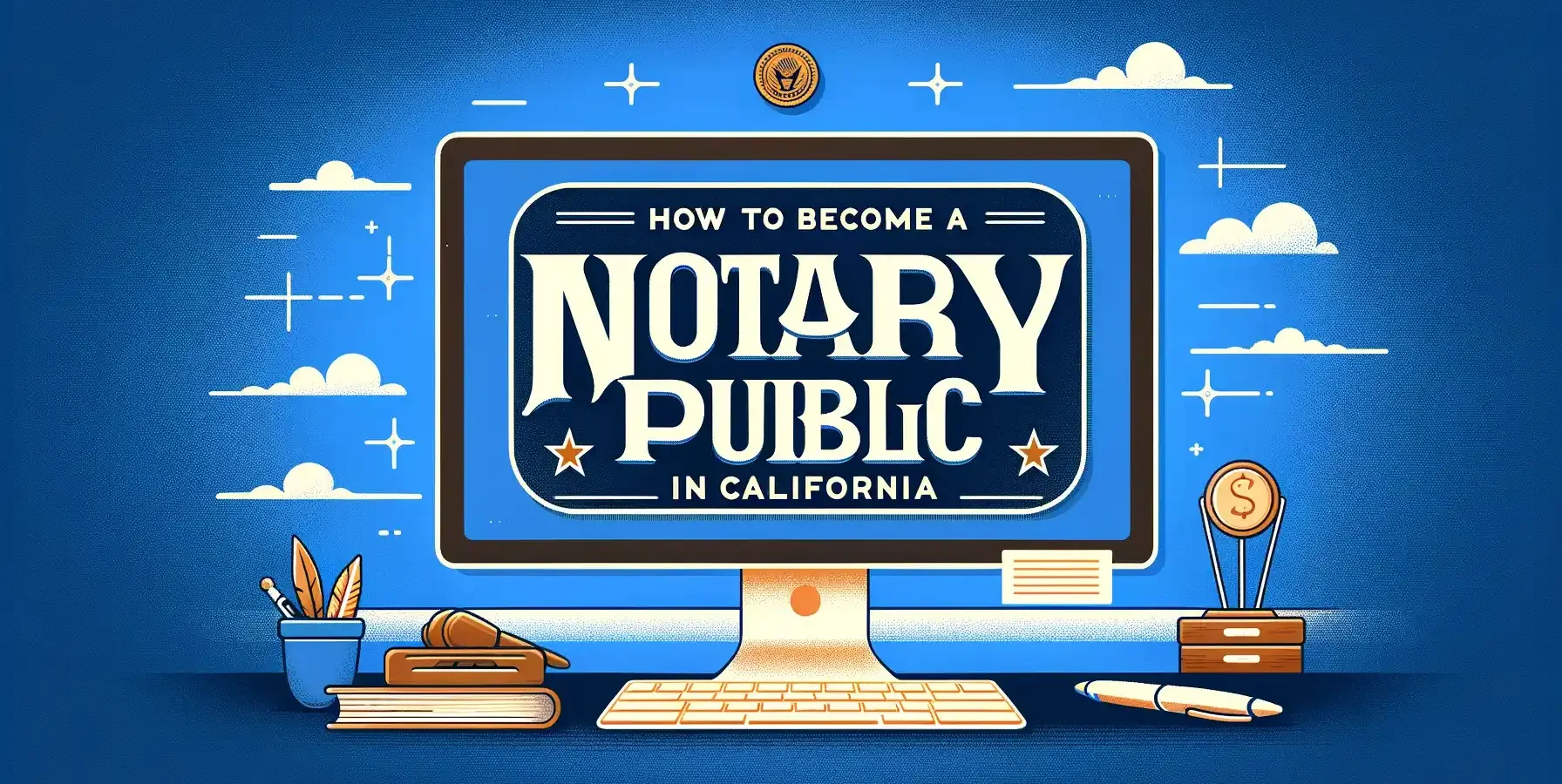How to Become a Notary Public in California: Step by Step
Becoming a Notary in California involves these steps:
Ensure you fulfill all the necessary qualifications (must be a California Resident).
Complete a six-hour course from an approved provider in California.
Fill out the California Notary Public application. And Register for the Exam
Ace the state exam. Remember to bring a photo ID, your application, a 2″x2″ color photo, your course completion certificate, a letter confirming your registration, and a $40 fee to the exam location.
Process your LiveScan fingerprinting for a background check, with locations listed by the Department of Justice.
Wait for your notary commission certificate to arrive by mail.
Secure a $15,000 surety bond.
Register your bond and oath at the county clerk’s office within 30 days.
What’s the Cost to Become a Notary in California?
In California, you must pay $40 to file your application and take the Notary exam. The total price will depend on the training course you pick, the surety bond you get, the background check through live scan, the passport-style photo, the equipment for your Notary, and the fees for filing your bond and oath at the county clerk’s office. The cost of becoming a Notary or renewing your commission is not always the same. New Notaries may find they need more resources, such as books, additional training, and access to live experts, which can cause the initial cost to increase.
What’s the Timeframe to Become a Notary in California?
The time between your Notary exam and receiving your commission can take two weeks to six months, depending on application volume. You should use the state’s online form (Form SOS/NP-30 (REV 02/2024)) to apply, print it single-sided, and sign it with a pen in ink, as electronic signatures are not accepted. Currently, the California Secretary of State is processing applications submitted with an exam date that is 10 to 12 weeks old. You will be able to check your results at least 15 business days following your exam.
What’s the Duration of a California Notary Commission?
It is valid for four years. Post this period, you will need to renew your commission to continue as a Notary.
What are the Qualification Requirements to Become a Notary Public?
Applicants are required to satisfy the following criteria:
Be at least 18 years old.
Be a legal resident of California.
Have no felony convictions or crimes involving dishonesty or other offenses that would make you unfit for the role.
Do you need training to be a Notary in CA?
Absolutely. First-time students need a six-hour course from an approved provider, such as the NNA. Renewing? A three-hour refresher is mandatory if you do so before your commission expires. The state’s Secretary of State office maintains a list of authorized education providers.
Is an Exam Required for California Notaries?
Yes. Both newcomers and renewers must pass a proctored written exam administered by Cooperative Personnel Services (CPS) with a score of at least 70%. Fail? It’s $20 to try again. CPS provides exam schedules and registration info. For exam locations and sign-ups, call (916) 263-3520.
What Supplies Do I Need?
You’ll need to purchase an ink stamp and a journal to begin working as a Notary. The state will issue a certificate that allows you to buy your seal from an approved vendor. Your seal should be either rectangular, no larger than 1″ x 2.5″ or circular, with a maximum diameter of 2″. You should include your name, the state seal, and all your commission details. Select a stamp that won’t bleed so your documents are not rejected. You should keep a record of every notarization in your journal to demonstrate that you completed the job and to provide proof in court.
Why Get a Surety Bond?
A $15,000 surety bond from an authorized company is required by state law. It compensates anyone harmed if you don’t fulfill your Notary duties properly. You’re responsible for repaying the surety for any claims made against the bond, including legal defenses.
Should I Get Errors and Omissions Insurance?
To protect against legal expenses or damages, it’s essential to have errors and omissions (E&O) insurance, which covers legal bills and damages up to your policy limit, including attorney fees.
Who Oversees California Notaries?
The Office of the Secretary of State, Business Programs Division, Notary Public Section in Sacramento handles Notary administration. The Notary Handbook contains all rules and regulations.
Where Can I Find Help and Training?
Many organizations, including the NNA, offer Notary training. The Secretary of State’s website features a database of approved education providers and resources like the state Notary Public Handbook.
Where and for Whom Can I Notarize?
You can notarize anywhere in California for any public member who meets all notarization requirements. You cannot notarize if you have a direct interest in the document. Notarizing for relatives is allowed unless it benefits you directly. Agreements with employers about notarization limitations and expenses are permissible.
What Fees Can California Notaries Charge?
California Notaries can charge up to $15 per act. You may add travel fees if the signer agrees beforehand.
What if My Details Change?
Report any address or name changes to the Secretary of State. For address changes, use the Notary Public Address Change form or a letter within 30 days. Name changes require a Notary Public Name Change form and a new seal with your updated name.
How do I Renew my Commission?
Renewal is similar to the initial process but requires only a three-hour course if done before expiry. Start six months in advance to avoid gaps in notarization. You can get your new commission 30 days before the old one expires.
What about remote online notarization (RON) in California?
RON laws were passed, but the Secretary of State must establish rules before they are implemented. California Notaries likely need to wait until at least 2025 for RON or later. We’ll update with a guide once more information is available. That said, Californian citizens are allowed to have their documents notarised by notaries online in other states, essentially allowing them to join the rest of the union by getting notarised from home.








